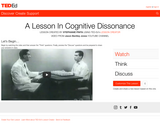
Two-minute video that defines dramtic irony.
- Subject:
- English Language Arts
- Material Type:
- Lesson
- Provider:
- TED
- Author:
- Christopher Warner
- Date Added:
- 02/26/2019

Two-minute video that defines dramtic irony.

This short video lesson provides a detailed examination of the cell membrane. Assessment and discussion questions, as well as links to additional resources, are included.

“You’re a fishmonger!” By taking a closer look at Shakespeare’s words--specifically his insults--we see why he is known as a master playwright whose works transcend time and appeal to audiences all over the world.

Just how small are atoms? And what's inside them? The answers turn out to be astounding, even for those who think they know. This fast-paced animation uses spectacular metaphors (imagine a blueberry the size of a football stadium!) to give a visceral sense of the building blocks that make our world.

This video explains cognitive dissonance and provides opportunities for students to respond to multiple choice and discussion questions.

This brief video lesson discusses the environmental impact of a t-shirt being made. Discussion/assessment questions and suggested supplemental resources are also included.

THis TED Talk video summarizes biological organization from a single cell to the biosphere of Earth.

In the TED Ed lesson focused on language, students will explore spelling, meaning, and the complex history behind the structure of words. Discussion questions and additional resources are linked in the sidebar.

Daniel Kraft offers a fast-paced look at the next few years of innovations in medicine, powered by new tools, tests and apps that bring diagnostic information right to the patient's bedside. Assessment questions and links to additional resources are included.

In this video Melissa Flemming of UN's refugee agency discusses Syrian refugees seeking shelter in neighboring countries. She calls on all of us to make sure that refugee camps are healing places where people can develop the skills they’ll need to rebuild their hometowns.

In this video Michael Green explains the need for a more effective tool to measure societies compared to using Gross Domestic Product. He calls for the international community to use the Social Progress Index as it measues societies acoress dimensions that actually matter in the twenty-first century.

This brief video lesson discusses how microscopic organisms organize to form communities known as biofilms. Discussion/assessment questions and suggested supplemental resources are also included.

Four-minute video on how to read and write more critically with an emphasis on analysis, big ideas, and deeper meanings.

This resource is a short video from TED ed, which details the linguistic origins of the word 'bewilder.' Accompanying short answer questions in the 'Discuss' section of the video's sidebar ask students to think about the changes in language over time and how prefixes alter the meaning and intent of language.

In this TED Ed lesson focused on the evolution of the word "dynamite," students will explore its roots, connotations, usage, and meaning. Discussion questions and additional resources available in the sidebar.

In this TED Ed lesson focused on the evolution of the word "earwig," students will explore its roots, connotations, usage, and meaning. Discussion questions and additional resources available in the sidebar.

In this TED Ed lesson focused on the evolution of the word "fizzle," students will explore its roots, connotations, usage, and meaning. Discussion questions and additional resources available in the sidebar.

In this TED Ed lesson focused on the evolution of the word "gorgeous," students will explore its roots, connotations, usage, and meaning. Discussion questions and additional resources available in the sidebar.

In this TED Ed lesson focused on the evolution of the word "hearse," students will explore its roots, connotations, usage, and meaning. Discussion questions and additional resources available in the sidebar.